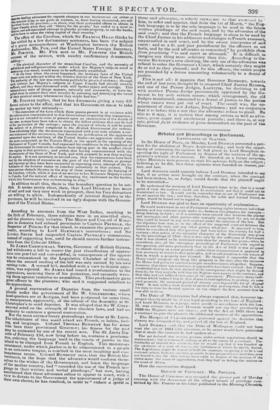According to accounts from the West Indies, reaching to the
25th of February, those colonies were in an unsettled state, and the planters very irritable. The Mayor and Council of King- ston in Jamaica had refused permission to Captain PRINGLE, the Inspector of Prisons for that island, to exatnine the prisoners pri• vately, according to Lord GLENELG'S instructions ; and Sir LIONEL SMITH had suspended Captain PRINGLE'S commission, instead of supporting him, until he should receive further instruc- tions from the Colonial Office.
Sir JAMES CARMICHAEL SMYTH, Governor of British Guiana, had withdrawn a bill to insure the just classification of appren- tices into pried ial and non-prredial, in consequence of the opposi- tion be encountered in the Legislative Chamber of the colony, where the second reading of the bill was only carried by his own casting-vote. A second bill, modified with a view to disarm oppo- sition, was rejected. Sir JAMES had issued a proclamation to the apprentices, assuring them of his protection, and earnestly warn- ing them against turnultueus assemblies. This proclamation gave great offence to the planters; who said it, suggested rebellion to the apprentices.
A general convocation of Deputies from the various small islands under the government of Sir W. COLEBROOKE, whose head-quarters are at Antigua, had been postponed, ler some time, in consequence, apparently, of the refusal of the Assembly at St Chnstopher's to send deputies. It was alleged that Sir W. Cote- BROOKE acted on the strength of two obsolete laws, and had no authority to summon a general convocation.
But the most extraordinary proceedings are those at St. Lucia. The inhabitants of this small island are French, in habits, feel- tag, and language. Colonel THOMAS Bummer has for some time been their provisional Governor; his fitness for the post may be estimated by one of his recent acts. The St. Lucia Ga- zette of February 23d, now lying before us, contains a proclama- tion, ordering the language used in the courts of justice in the island to be changed from French to English. This monstrous enactment, under which justice is to be administered to a people in an unknown tongue, is couched in the most insulting and con- temptuous terms. Colonel SUNBURY says, that the British Go- vernment, in the hope that the advocates would conform them- selves to the wishes of the Government, and learn the language of the mother country, had "conceded the use of the French lee- Page in their written and verbal pleadings ;" but now, having ascertained that those advocates refuse to appear in court, with a view to dictate to the Government the appointtnent of a judge of their own choice, he has resolved, in order to" reduce a spirit in these said advocates, Fo utterly reptuilant to that exeresed by him, to order and appoint, that from the 1st of March, " the Eng- lish language is to be the sole language to be used in the futune written pleadings of the said court, and by the advocates of the said court ; and that the French language is alone to be used by the Chief Justice in his addresses and charges to French assessors empannelled in said court, and by the sworn interpreter of said court : and as a fit and just punishment for the offences so set forth, and by the said advocates so committed," he prohibits then from practising "iii said court as aforesaid." It is difficult te imagine any thing more arbitrary than this. According to Go- vernor BuNBURY'S own showing, the only sin of the advocates was refusal to enter the Governor's Court, which certainly they might do or not as they pleased ; and for this offence, the entire people are punished by a decree amounting substantially to a denial at justice. This is not all : it appears that Governor SUNBURY, towards the end of last year, thought fit to suspend Chief Justice REDDER, and one of the Puisne Judges, LAFFITTE, for declining to act with another Puisne Judge provisionally appointed by the Go- vernor to try only certain causes; which arrangement, the old Judges maintained, amounted to a denial of justice to the parties whose causes were put out of court. The result was, the ap- pointment of three new Judges, Englishmen ; and we conjecture that it is before this curt that the advocates refuse to plead. Be this as it may, it is certain that among suitors as well as advo- cates, great. anger and excitement prevails; and there is, at any rate, prima facie evidence of gross misconduct on the part of ths Governor.


























 Previous page
Previous page